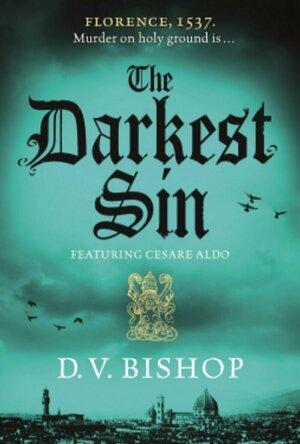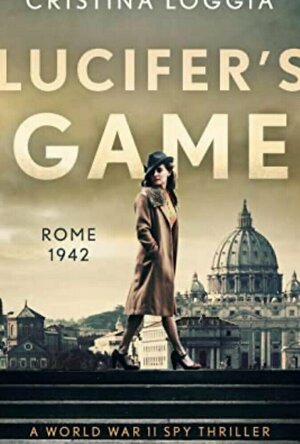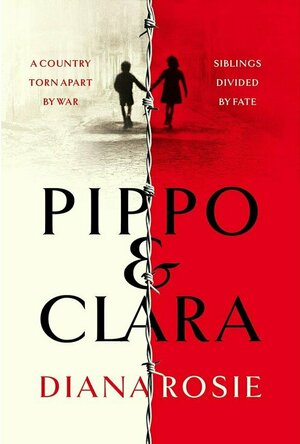Search
Search results
ClareR (6096 KP) rated The Darkest Sin in Books
Dec 4, 2023
I loved this follow up to The City of Vengeance, and Cesare Aldo is quickly becoming one of my favourite characters in historical fiction at the moment. And that’s saying a lot, because I read quite a bit of historical fiction!!
This story picks up not long after book 1, and Aldo is called to a convent that has had reports of an intruder. This isn’t a harmonious convent, though. There are opposing ideas on what sort of convent it should be (with some very unchristian nuns!), and it has it’s share of secrets.
Meanwhile, Constable Carlo Strocchi has taken his new wife home to introduce her to his mother, and he happens to stumble across the remains of a rather unpopular former officer of the city’s criminal court. And it looks as though he has been murdered.
I love this blend of historical fact and fiction: the Medici’s and the roles of nuns (to be enclosed or not?), the inequalities in Italian society at the time, women’s roles and lack of power, the structure of authority and how the catholic church ruled supreme (and not particularly morally). Aldo is the bastard son of a wealthy man, and when he is ‘reunited’ with his family, he’s not exactly welcomed back with open arms. He does however meet his niece, and she is far more accepting of him, even if it is, I think, a way of getting her own way!!
This is such an atmospheric read, and is thoroughly addictive. There are enough twists, turns and threats to Aldo’s life to make it very difficult to put the book down!
So is Aldo a threat to my love of Giordano Bruno or Matthew Shardlake? Err, nope, but he’s joining them - and if you like either of these, you’ll love Aldo Cesare!
This story picks up not long after book 1, and Aldo is called to a convent that has had reports of an intruder. This isn’t a harmonious convent, though. There are opposing ideas on what sort of convent it should be (with some very unchristian nuns!), and it has it’s share of secrets.
Meanwhile, Constable Carlo Strocchi has taken his new wife home to introduce her to his mother, and he happens to stumble across the remains of a rather unpopular former officer of the city’s criminal court. And it looks as though he has been murdered.
I love this blend of historical fact and fiction: the Medici’s and the roles of nuns (to be enclosed or not?), the inequalities in Italian society at the time, women’s roles and lack of power, the structure of authority and how the catholic church ruled supreme (and not particularly morally). Aldo is the bastard son of a wealthy man, and when he is ‘reunited’ with his family, he’s not exactly welcomed back with open arms. He does however meet his niece, and she is far more accepting of him, even if it is, I think, a way of getting her own way!!
This is such an atmospheric read, and is thoroughly addictive. There are enough twists, turns and threats to Aldo’s life to make it very difficult to put the book down!
So is Aldo a threat to my love of Giordano Bruno or Matthew Shardlake? Err, nope, but he’s joining them - and if you like either of these, you’ll love Aldo Cesare!
ClareR (6096 KP) rated Lucifer’s Game in Books
Feb 15, 2022
This was an enjoyable, well-researched historical fiction novel set during WW2 in Rome.
Cordelia Olivieri’s life in Rome becomes more precarious as the Italian fascists start to identify more Italians with Jewish heritage. Cordelia’s English mother was Jewish. She has a friend in the Vatican who promises to get her on a transport to England, if she will just photograph the German plans for North Africa. This seems a simple task (or not!), as the German officer in charge of the planning for Rommel has taken over Cordelia’s hotel as his centre of operations. But Cordelia complicates things somewhat when she starts to fall in love with him.
The villains in this book are thoroughly despicable, and the ‘goodies’ are in constant danger. It’s all very nail-bitingly exciting and another great read on The Pigeonhole!
Cordelia Olivieri’s life in Rome becomes more precarious as the Italian fascists start to identify more Italians with Jewish heritage. Cordelia’s English mother was Jewish. She has a friend in the Vatican who promises to get her on a transport to England, if she will just photograph the German plans for North Africa. This seems a simple task (or not!), as the German officer in charge of the planning for Rommel has taken over Cordelia’s hotel as his centre of operations. But Cordelia complicates things somewhat when she starts to fall in love with him.
The villains in this book are thoroughly despicable, and the ‘goodies’ are in constant danger. It’s all very nail-bitingly exciting and another great read on The Pigeonhole!
ClareR (6096 KP) rated Pippo and Clara in Books
Apr 16, 2021
Pippo and Clara begins in 1938, in Italy. Mussolini is in power and WW2 is imminent. The Fascists have control of the country, but not necessarily the people, and the Italian Communists are fighting back.
Pippo and Clara arrive in the city with their mother after their Romany father is murdered. One morning their mother gets up early to buy food and doesn’t return. Clara goes to look for her, turning right at the entrance to their building; later Pippo awakens and goes to look for his mother and Clara, turning left at the entrance. This change in direction means the children don’t see one another for a long time.
Luckily, they are each adopted into families (unofficially) who love and care for them - Clara’s family are Fascists, Pippo’s are Communists.
This was such an emotional story. It wasn’t just what happened to these children, it was the bigger picture as well. When the inevitable happens and the Germans occupy Italy, Jews are rounded up and taken away, people fear for their freedom and their lives.
It was fascinating to read about the Freedom Fighters (Partisans) and their acts of espionage, as well as how they fought back. This included even those who had been fascists under Mussolini’s regime.
There’s so much to talk about in this book (perfect for a book club, I should think!), but I won’t spoil it. Needless to say, I really enjoyed it and was thoroughly heartbroken by the end. Any book about war is going to have tragic elements, but this is about hope as well, and the fact that good can, and did, overcome evil.
Another recommendation for the historical fiction fans. It’s a fabulous novel.
Pippo and Clara arrive in the city with their mother after their Romany father is murdered. One morning their mother gets up early to buy food and doesn’t return. Clara goes to look for her, turning right at the entrance to their building; later Pippo awakens and goes to look for his mother and Clara, turning left at the entrance. This change in direction means the children don’t see one another for a long time.
Luckily, they are each adopted into families (unofficially) who love and care for them - Clara’s family are Fascists, Pippo’s are Communists.
This was such an emotional story. It wasn’t just what happened to these children, it was the bigger picture as well. When the inevitable happens and the Germans occupy Italy, Jews are rounded up and taken away, people fear for their freedom and their lives.
It was fascinating to read about the Freedom Fighters (Partisans) and their acts of espionage, as well as how they fought back. This included even those who had been fascists under Mussolini’s regime.
There’s so much to talk about in this book (perfect for a book club, I should think!), but I won’t spoil it. Needless to say, I really enjoyed it and was thoroughly heartbroken by the end. Any book about war is going to have tragic elements, but this is about hope as well, and the fact that good can, and did, overcome evil.
Another recommendation for the historical fiction fans. It’s a fabulous novel.
Hazel (1853 KP) rated The Ice-Cream Makers in Books
Dec 14, 2018
<i>I received this book for free through Goodreads First Reads.</i>
An intriguing blurb promises an incredible story about an Italian ice-cream making family, however the story is nothing like you expect. Ernest van der Kwast’s <i>The Ice-Cream Makers</i> is set between a small village in Italy and the busy summer streets of Rotterdam. The Talamini family has been creating innovative ice-cream flavours for over a century, running a successful and hard-working parlour in the Netherlands. The business is handed down from father to son throughout the years, but now eldest son Giovanni has broken the tradition.
Giovanni Talamini has no interest in making ice-cream and would much rather spend the day reading poetry. After pursuing a literary career, Giovanni is now the director of the World Poetry Festival. Younger brother Luca has been left to pick up the <i>spatula</i> of the family business, but he has a problem of his own. Giovanni faces a dilemma: cut himself of from his family entirely or help his brother out with his peculiar request.
The highly unusual request mentioned in the blurb of <i>The Ice-Cream Makers</i> does not actually surface until the latter stages of the book. For the majority of the narrative there is no clear storyline, however the detail and information van der Kwast provides about ice-cream making, poetry and European culture makes the novel entirely worth reading. The request itself is entirely unexpected and not at all possible to guess, but it is an oddly brilliant way of reuniting two estranged brothers.
It takes a while for the narrative to start flowing as it constantly changes time periods. Giovanni, the narrator, rarely speaks in the present tense and is constantly relating events from his childhood and adulthood interspersed with family history and historical knowledge. On occasion the book takes on the air of an autobiography as Giovanni gives an in depth insight to the life of his family and his break from tradition. There is also the odd chapter that becomes almost a work of non-fiction, providing the reader with highbrow literary references and factual information about the history of ice-cream.
Once the scenes caused by the male sexual mind have been glossed over, <i>The Ice-Cream Makers</i> becomes a beautifully written, almost poetical story that compels and engages the reader despite the lack of a clear-cut storyline. The literary references will appeal to the intellectual, scholar, philosopher or culture enthusiast, for this novel teaches and inspires as well as entertains.
The amount of research van der Kwast conducted is phenomenal. The accuracy (or so is presumed) of the historical factors implies the author had thoroughly investigated the subject matter prior to writing. It is almost as though van der Kwast lived the life of Giovanni; it is entirely believable – hence the sense of an autobiography. Although the nature of the novel’s theme suggests a serious tone, van der Kwast has included a great deal of humour in the form of Giovanni and Luca’s father and his questionable mental health.
The lack of a climax prevents <i>The Ice-Cream Makers</i> from being described as an exciting book, however its beautifully poetic prose makes up for this absence. The philosophical insight into poetry will make you think about life and admire Giovanni for insisting on making his own way in the world. Likewise, Luca’s quiet acceptance and perseverance in the family business is also an admirable feat. Readers with a dislike for descriptive sexual scenarios may feel uncomfortable in a few of the resulting scenes, however the general story compensates for these distasteful passages. All in all, a high-quality work of fiction.
An intriguing blurb promises an incredible story about an Italian ice-cream making family, however the story is nothing like you expect. Ernest van der Kwast’s <i>The Ice-Cream Makers</i> is set between a small village in Italy and the busy summer streets of Rotterdam. The Talamini family has been creating innovative ice-cream flavours for over a century, running a successful and hard-working parlour in the Netherlands. The business is handed down from father to son throughout the years, but now eldest son Giovanni has broken the tradition.
Giovanni Talamini has no interest in making ice-cream and would much rather spend the day reading poetry. After pursuing a literary career, Giovanni is now the director of the World Poetry Festival. Younger brother Luca has been left to pick up the <i>spatula</i> of the family business, but he has a problem of his own. Giovanni faces a dilemma: cut himself of from his family entirely or help his brother out with his peculiar request.
The highly unusual request mentioned in the blurb of <i>The Ice-Cream Makers</i> does not actually surface until the latter stages of the book. For the majority of the narrative there is no clear storyline, however the detail and information van der Kwast provides about ice-cream making, poetry and European culture makes the novel entirely worth reading. The request itself is entirely unexpected and not at all possible to guess, but it is an oddly brilliant way of reuniting two estranged brothers.
It takes a while for the narrative to start flowing as it constantly changes time periods. Giovanni, the narrator, rarely speaks in the present tense and is constantly relating events from his childhood and adulthood interspersed with family history and historical knowledge. On occasion the book takes on the air of an autobiography as Giovanni gives an in depth insight to the life of his family and his break from tradition. There is also the odd chapter that becomes almost a work of non-fiction, providing the reader with highbrow literary references and factual information about the history of ice-cream.
Once the scenes caused by the male sexual mind have been glossed over, <i>The Ice-Cream Makers</i> becomes a beautifully written, almost poetical story that compels and engages the reader despite the lack of a clear-cut storyline. The literary references will appeal to the intellectual, scholar, philosopher or culture enthusiast, for this novel teaches and inspires as well as entertains.
The amount of research van der Kwast conducted is phenomenal. The accuracy (or so is presumed) of the historical factors implies the author had thoroughly investigated the subject matter prior to writing. It is almost as though van der Kwast lived the life of Giovanni; it is entirely believable – hence the sense of an autobiography. Although the nature of the novel’s theme suggests a serious tone, van der Kwast has included a great deal of humour in the form of Giovanni and Luca’s father and his questionable mental health.
The lack of a climax prevents <i>The Ice-Cream Makers</i> from being described as an exciting book, however its beautifully poetic prose makes up for this absence. The philosophical insight into poetry will make you think about life and admire Giovanni for insisting on making his own way in the world. Likewise, Luca’s quiet acceptance and perseverance in the family business is also an admirable feat. Readers with a dislike for descriptive sexual scenarios may feel uncomfortable in a few of the resulting scenes, however the general story compensates for these distasteful passages. All in all, a high-quality work of fiction.



